Order McKenzie books online with a credit card
Bring Jamie to your school or district for a great workshop
 © Sarah McKenzie For better, for worse, for richer, or for poorer?By Jamie McKenzie(about author) |
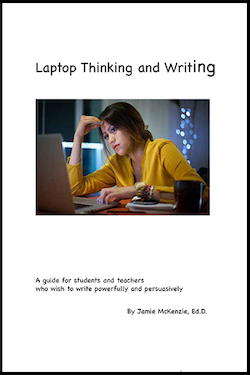 You can order Laptop Thinking and Writing here |
|---|
How rich is the palette today's students can apply to thinking challenges? When the Internet arrived in American schools almost 30 years ago, it was greeted with thunderous applause. Many educators, myself included, predicted that the vast information made available by this innovation could radically improve schools and learning. I predicted it would spawn a generation of Free Range Students.  I wrote an article subsequently published in the October, 1998 Phi Delta Kappan, "Grazing the Net: Raising a Generation of Free Range Students" that asked, "Is this a good thing for schools?" If free range students are "young people capable of navigating through a complex, often disorganized information landscape while making up their own minds about the important issues of their lives and their times," then we have not seen the Internet work that wonder or cause that miracle to happen.  © iStock.com There have been some great benefits, but the overall impact of the Internet on schools has been a mixed blessing. Thus the title of this article, "For better, for worse, for richer, or for poorer?" Rich information resources - The arts and music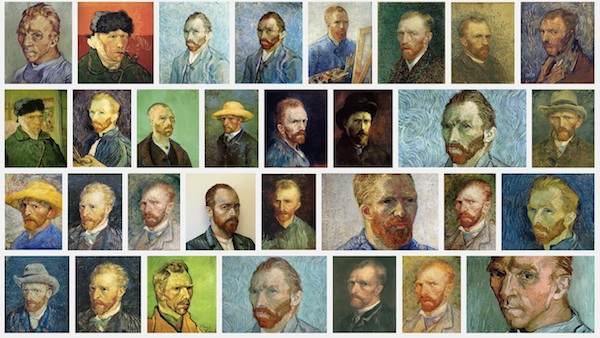
Student access to great photography, music and paintings has improved dramatially since the 1970s. YouTube allows them to taste a wide range of musical performances while Google points them to astonishing collections of visual treasures. Back in the 1970s students were quite limited regarding such resources, often having to rely upon the scant offerings available from the vertical files and record collections of school or town libraries. 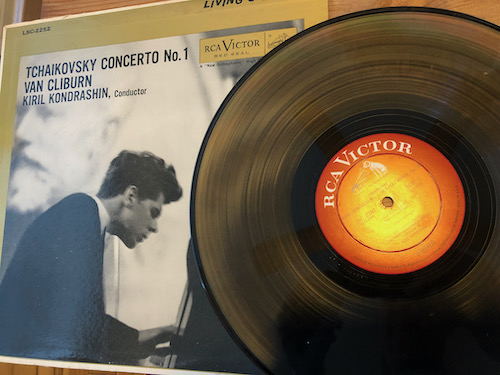 The recording pictured above from the 1958 amazing performance of Van Cliburn, can today be enjoyed for free by students on YouTube complete with a film showing him playing - a feature not included in the LP record. While access to such works of art and masterpieces has multiplied a thousandfold, this availability does not automatically enlighten students. To cast light upon them and enhance their understanding of life, students must spend time listening, tasting and appreciating these works. Unless there is significant engagement with these gems, they might as well remain hidden in dust jackets. Rich information resources - Foreign cities and nationsAs with artistic resources, without going to the library, today's students are able to learn a great deal online about cities and nations. Back when I began teaching social studies in the 1960s, they had to rely upon the library and send snail mail requests to consulates in New York City to get printed information. Now, the information is abundant and quickly accessible; however, that very abundance may be a problem in itself. Finding truth can be a difficult task.The poverty of abundanceWhen a student tries to learn about a foreign city like Hong Kong, there is so much information available, one might "drown" in the vast oceans that arise during the search process. When combined with old fashioned topical research tasks like "Go find out about Hong Kong," the student is tempted to copy and paste without much thought. When the length of the report is valued more than the insight developed, such hunting and gathering is mindless, boring and a waste of time.In a previous article - "Other Worldly Research" - I provided strategies to guard against such trivial pursuit: How can we best equip students to build their own meanings? To find their own truths? To pass beyond secondhand truths or cut-and-paste thinking?We engage students in mapping out the key facets of life in a city that will guide their study. 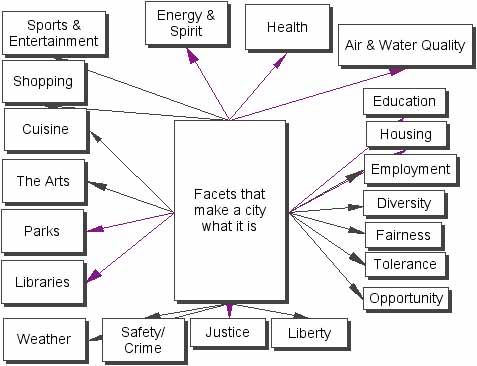 And then we teach them how to pose questions that will lead them past false claims and marketing to grasp life in that city with a degree of truth. We teach them about the types of bias most apt to distort or block their understanding. This process is outlined in some detail in the article - "Other Worldly Research." Doubtful information resourcesUnderstanding their world is now complicated for students by the proliferation of Web sites and online publications that offer up false information as if it were truthful. This has been especially important lately as the world struggles to stop the vigorous and persistent advance of COVID. Opponents of vaccination have been propagating rumors and falsehoods at an alarming rate, and many citizens have embraced these falsehoods stubbornly. Sadly, this proliferation of misleading Web sites is a problem when exploring almost any social issue, whether it be global warming, windmills, addiction or Russia's intentions regarding the Ukraine. Good social studies teachers and school librarians must equip students with the critical thinking skills to assess the veracity of Web sites, debunking false claims when they encounter them while demanding evidence and science-based facts from those who make preposterous claims. Some have called this "The Essential Skill of Crap Detecting" - a term originally coined by Hemingway. Hemingway said, “In order to be a great writer a person must have a built-in, shockproof crap detector.” In Teaching As a Subversive Activity, Postman and Weingartner stated in 1971, "We believe that the schools must serve as the principal medium for developing in youth the attitudes and skills of social, political, and cultural criticism."  © iStock A half century later, it is impossible to find evidence that American schools have succeeded in developing those critical skills. In fact, the NAEP test of civics shows what amounts to stagnation since 1998, with less than a quarter of American 8th graders scoring at or above the proficient level. This is horrific evidence of failure. It is no wonder that so many students emerge from school susceptible to propaganda, falsehoods and manipulation by demagogues. 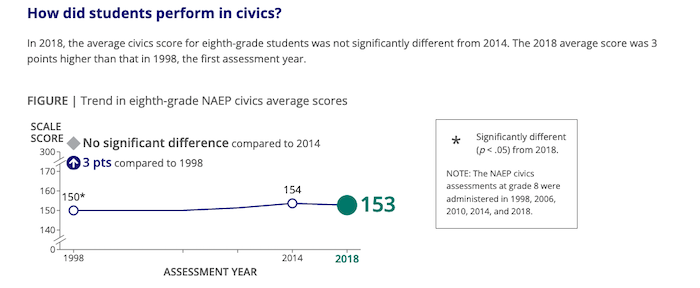  Sample questions from this test illustrate the failure that has persisted through five decades of American schooling, as those items that require critical thought have frustrated 75% of the students throughout those years. Ego-CastingMany observers have suggested that the Internet leads to a kind of intellectual impoverishment by providing users with information that supports their existing biases and points of view. This can add to the acute polarization that now characterizes American political life. The term "ego-casting" was first coined by Christine Rosen in her 2004 essay, "The Age of Egocasting."By giving us the illusion of perfect control, these technologies risk making us incapable of ever being surprised. They encourage not the cultivation of taste, but the numbing repetition of fetish. And they contribute to what might be called “egocasting,” the thoroughly personalized and extremely narrow pursuit of one’s personal taste. In thrall to our own little technologically constructed worlds, we are, ironically, finding it increasingly difficult to appreciate genuine individuality.In more recent years, such subtle steering has been delivered by social media sites like Facebook and search engines like Google. In March 2019, I wrote an article "Escaping Google's Stranglehold" that described how Google shapes the search experience to match one's preferences and points of view. It is essential that schools teach students how to escape this stranglehold that Google creates. While helping visitors to find the information they need, Google effectively limits and narrows their searches - steering them toward the obvious and the conventional. That is fine when you want the date of a battle or the name of Isadora Duncan's Russian husband, but it is not at all helpful when trying to reach a deep understanding about something as complex as character. Google is much better at supporting convergent thought than it is at enabling divergent exploration. The damaging impact of No Child Left BehindBeginning in 2002, two presidents and Congress imposed a very limiting, basic skills test-driven agenda on American schools that narrowed the focus of learning to reading and math in many places. The importance of creative and critical thinking fell by the wayside. We suffered through more than 14 years of this madness before Washington loosened its stranglehold on schools. The chances of children becoming "free range students" under such a regime were negligible. While the Common Core Standards sought to elevate the kinds of thinking students must demonstrate, that effort produced disappointing results and became bogged down in political controversies.Inquiry learning, combined with divergent, critical and creative thought should be a priority for all schools and all learners, but in a time of pandemic and shuttered schools, these kinds of goals are sadly finding few champions. This sorry state of affairs must change, and schools must raise the bar along with policy makers at the state and national level.  © iStock |
Written materials, art work and photography on this site are copyrighted by Jamie McKenzie and other writers, artists and photographers. Written materials on these pages may be distributed and duplicated if unchanged in format and content in hard copy only by school districts and universities provided there is no charge to the recipient. They may also be e-mailed from person to person. All other uses, transmissions and duplications are prohibited unless permission is granted expressly. Showing these pages remotely through frames is not permitted. FNO is applying for formal copyright registration for articles.
Network 609
Denver, CO 80220
Inquiries via email please
